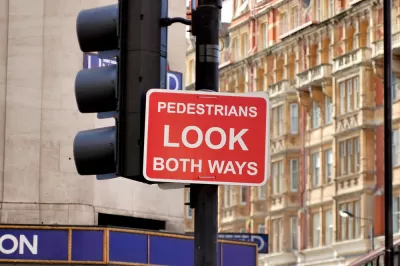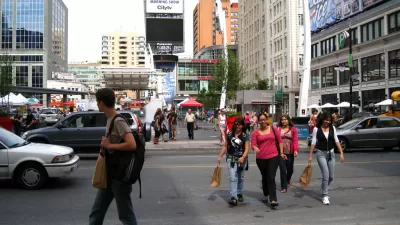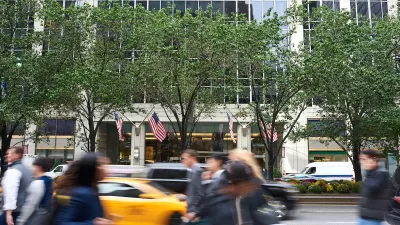Beginning in March, police will no longer be able to stop people for crossing the street outside of a crosswalk, a small component of reform intended to protect BIPOC from the historically discriminatory application of traffic laws.

Wyatt Gordon reports from Virginia, where a bill to decriminalize jaywalking was approved by the General Assembly earlier this year.
"Though it didn’t garner as much attention as other police reform measures during the special legislative session that ended this fall, a provision to decriminalize jaywalking in a pretextual policing bill from Delegate Patrick Hope, D-Arlington, means that come March 1, police will no longer be able to stop folks for the act of crossing the street outside of a marked crosswalk," writes Gordon.
"Criminal justice reformers called it a small step along the path to reducing encounters with the police, especially for people of color," adds Gordon, to assess the significance of the change in the law.
Gordon provides a lot more detail on what is means to decriminalizing jaywalking, and by extension the unofficial by highly damaging crime of "walking while black."
A 2019 audit of the New York Police Department revealed that officers issued 90 percent of “illegal or unsafe crossing” tickets to Blacks and Hispanics although those two groups make up just 55 percent of the Big Apple’s population. A ProPublica investigation in Jacksonville, Florida similarly found Black residents received 78 percent of all tickets for “walking in the roadway where sidewalks are provided” despite comprising just 29 percent of the city’s population.
Gordon also includes analysis of concerns that by legalizing jaywalking, the state might encourage risky or dangerous behaviors by pedestrians.
FULL STORY: Jaywalking decriminalization is coming, 100 years after the auto industry helped make it a crime

Maui's Vacation Rental Debate Turns Ugly
Verbal attacks, misinformation campaigns and fistfights plague a high-stakes debate to convert thousands of vacation rentals into long-term housing.

Planetizen Federal Action Tracker
A weekly monitor of how Trump’s orders and actions are impacting planners and planning in America.

In Urban Planning, AI Prompting Could be the New Design Thinking
Creativity has long been key to great urban design. What if we see AI as our new creative partner?

King County Supportive Housing Program Offers Hope for Unhoused Residents
The county is taking a ‘Housing First’ approach that prioritizes getting people into housing, then offering wraparound supportive services.

Researchers Use AI to Get Clearer Picture of US Housing
Analysts are using artificial intelligence to supercharge their research by allowing them to comb through data faster. Though these AI tools can be error prone, they save time and housing researchers are optimistic about the future.

Making Shared Micromobility More Inclusive
Cities and shared mobility system operators can do more to include people with disabilities in planning and operations, per a new report.
Urban Design for Planners 1: Software Tools
This six-course series explores essential urban design concepts using open source software and equips planners with the tools they need to participate fully in the urban design process.
Planning for Universal Design
Learn the tools for implementing Universal Design in planning regulations.
planning NEXT
Appalachian Highlands Housing Partners
Mpact (founded as Rail~Volution)
City of Camden Redevelopment Agency
City of Astoria
City of Portland
City of Laramie





























